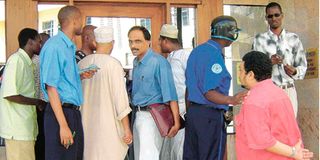After 15 years, CBK finally winds up Charterhouse Bank

Customers outside Charterhouse Bank in Nairobi after its closure in 2006.
It is an end of the road for Charterhouse Bank, after the Central Bank of Kenya (CBK) finally appointed a liquidator to wind up the lender that was shut down 15 years ago amidst money laundering claims.
The banking sector regulator announced on Friday that it had appointed the Kenya Deposit Insurance Corporation (KDIC) as liquidator of Charterhouse Bank Limited (CHB) in terms of Section 54(1)(b)(v) of the Kenya Deposit Insurance Act, 2012.
This follows the submission of the Statutory Management Report by the Statutory Manager on May 6, 2021, recommending that CHB be liquidated.
The report indicates that in view of the severe violations of the Banking Act by CHB and its inability to address them, liquidation is the only feasible option.
“CBK has assessed the recommendation and considered that liquidation would facilitate the orderly resolution of the assets and liabilities of CHB in accordance with the Laws of Kenya, to protect the interest of CHB depositors, its creditors, other stakeholders and the wider public interest,” the CBK said in a statement.
Charterhouse was established in 1996 after taking over the operations of Middle East Kenya Finance Limited.
Subsequently, the institution converted to a fully-fledged bank in 1998. The bank had 10 branches in Nairobi, Kisumu and Mombasa. Eight of these branches were located at branches of the erstwhile Nakumatt Supermarket Stores, an associate of the bank through common shareholding.
Asset base of Sh4 billion
By 2006, CHB was classified as a small bank, ranked 30 out of 41 banks with an asset base of Sh4 billion and a market share of 0.55 percent. It had 428 loan accounts valued at Sh2.9 billion and 4,699 deposit accounts valued at Sh2.9 billion. Its equivalent ranking at end 2020 with the 2006 asset base would be the smallest of all banks.
CBK placed the lender under statutory management on June 23, 2006, pursuant to Section 34(1) (d) of the Banking Act.
“This followed severe violations of the Banking Act by CHB relating to lending, accuracy of returns submitted to CBK, and failure to obtain account opening documentation for a number of customers. The placement of CHB under statutory management and takeover by CBK was done in the interest of the bank’s depositors, creditors and members of the public,” CBK said in the statement.
The regulator said KDIC would release information about the liquidation of the bank and payment of depositors in due course.
Trouble for the bank started in 2004 when former Finance minister David Mwiraria formed a task force with officers from the Ethics and Anti-corruption Commission (EACC), the CBK, the Kenya Revenue Authority (KRA), the Department of Governance and Ethics from the Office of the President, which authored an interim report implicating the bank.
Money laundering
Among the firms under investigation over alleged money laundering and tax evasion through Charterhouse is W. E. Tilley, which is also at the centre of the fall of Imperial Bank.
In its early days, its branches were located inside Nakumatt Supermarkets, an associate of the bank through common shareholding, according to a Central Bank report.
The bank was started as a family business and apart from Nakumatt, it shared directors with Kingsway Group via the parent holding company Ram Trust.
The directors were Manish Shah, Manoj Shah, Artur Shah, and Sanjay Shah.
Ram Trust was named after the father of Kingsway Tyres, the late Ramniklal P. Shah—commonly known as Ram—who in 1962 opened a small shop on the then Kingsway road (now University Way) to sell tyres.
The statutory management report found correspondence that showed the bank’s managing director regularly drafted letters on behalf of Tusker Mattresses and Creative Innovations—companies associated with the family—guiding them on how to correspond to KRA and Kenya Anti-Corruption Commission on tax demands.
When CBK governor Dr Andrew Mullei initiated investigations into the bank, the investigators found that the bank and well-known companies associated with it could have been costing the country more than Sh6 billion ($83.3 million) a year in tax evasion.





